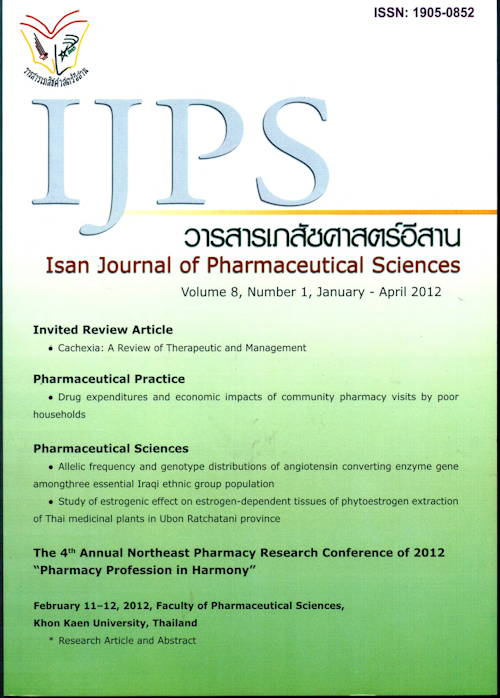Impact of berberine on regulation of glutathione peroxidase and superoxide dismutase in diabetes-induced mouse liver
Main Article Content
Abstract
Introduction: Diabetes mellitus (DM) is a chronic disease which has been increasing nowadays and subsequently devastates quality of life and economic status of a patient. Oxidative stress participates in development and progression of diabetes, in which levels of glutathione peroxidase (GPx) and superoxide dismutase (SOD) have been changed in DM. Berberine has been widely used as an alternative medicine and proved to be effective for treatment of DM and dyslipidemia. The present study aims to measure effect of berberine on regulation of GPx and SOD genes at transcriptional level in diabetic induced mouse liver compared to a typical hypoglycemic drug metformin. Materials and method: Male ddY mice at 6 weeks of age were divided into two main groups consisted of the normal and streptozotocin-induced diabetic mice. Each group was randomly divided into three groups (n=5) including the control group and the metformin treated (100 mg/kg/d, p.o., daily for 2 weeks) and the berberine treated (200 mg/kg/d, p.o., daily for 2 weeks) groups. 24 hours after the last treatment, livers were excised to prepare total RNA. Determination of GPx, CuZn-SOD, and Mn-SOD mRNA expression was performed by polymerase chain reaction. Relative mRNA expression was analyzed using ANOVA with Tukey post hoc test. Results: Expression of GPx mRNA was inducible while that of CuZn-SOD mRNA was suppressed in diabetic induced mouse liver. Berberine showed the same hypoglycemic potential as metformin, with no change of the levels of GPx, CuZn-SOD, and Mn-SOD mRNA in the normal mice, while it significantly restored the mRNA levels of PRx and CuZn-SOD in the diabetics to nearly the same levels as the normals. Conclusion: These observations suggested that berberine conveyed anti-oxidative potential via expression of GPx and CuZn-SOD at transcriptional level. Therefore, use of berberine as an alternative medicine for hypoglycemic action could bring extra beneficent consequence according to its anti-oxidative potential.
Article Details
In the case that some parts are used by others The author must Confirm that obtaining permission to use some of the original authors. And must attach evidence That the permission has been included
References
Hayashi K, Kolima R. Ito M. strain differences in the diabetogenic activity of streptozotocin in mice. Bio} Pharm Bull 2006; 29: 1110-1119.
Lenzen S. The mechanism of alloxan and streptozotocin-induced diabetes. Diabetologia 2007; 51: 216-226.
Likidlilid A, Patchanans N, Poldee S, Peerapatdit T. Glutathone and glutathione peroxidase in type 1 diabetic patients. J Med Assoc Thailand 2007; 90: 1759-1767.
Maritim AC, Sanders RA, Watkins JB. Diabetes, oxidative stress, and antioxidlant. Biochem Mol Toxico! 2002; 17: 24-38.
Mouatassim S, Guerin p, Menezo Y. Expression of genes encoding antioxidant enzymes in human and mouse oocytes during the final stages of maturation. Mol Human Reprod 1999; 5: 720-725.
Srinivasan K, Romarao p. Animal model in type 2 diabetes research: An overviiew. Indian J Med Res 2007; 125: 451-472.
Szkudelski T. The mechanism of alloxan and streptozotocin action in B cell of the rat pancreas. Physiol Res 2001; 50: 536-546.
Tang LQ, Wei W, Chen LM„ Liu S. Effect of berberine on diabetes induced by alloxan and a high-fat/high- cholesterol diet in rats. J Ethnopharmacol 2006; 108: 109-115.
Wang Y, Campbell T, Perry B, Beaurepaire c, Qin L. Hypoglycemic and insulin sensitizing effect of berberine in high-fat diet-and streptozotocin- induced diabetic rats. Metabolism 2010; 60:298-305.
Wohaieb SA, Godin DV. Alterations in free radical tissue-defense mechanism in streptozotocin-induced diabetes in rat, Effects of insulin treatment Diabetes 1987; 36: 1014-1018.
Yin J, Xing H, Ye J. Efficacy of berberine in patients with type 2 diabetes mellitus. Met Cli Expert 2008; 57: 712-717.
Zhang Y, Li X, Zou D, et al. Treatment of type 2 diabetes and dyslipidemia with the natural plant alkaloid berberine. J Clin Endrocrinol Metab 2008; 93: 2559-2565.
Zhang Q, Xiao X, Feng K, et al. Berberine moderates glucose and lipid metabolism through multi pathway mechanism. Evid Based Complement Alternat Med 2011; 2011: 1-10.


